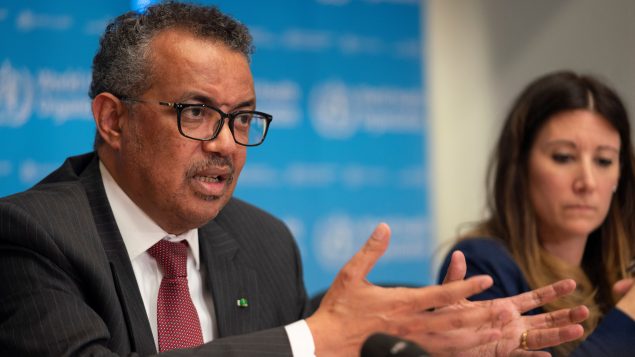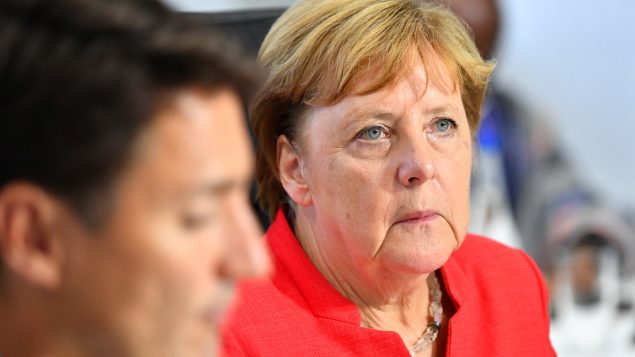Prime Minister Justin Trudeau and his German counterpart, Chancellor Angela Merkel, discussed on Monday efforts to secure equitable global access to COVID-19 vaccines, diagnostics and treatments, as the UN health body warned that “the world is on the brink of a catastrophic moral failure.”
Trudeau and Merkel “underlined the vital role of safe and effective vaccines to control and end the pandemic around the world,” according to the readout of the phone conversation released by the Prime Minister’s Office.
The two leaders “agreed on the importance of a coordinated international response” amid ongoing concerns that the global scheme to deliver COVID-19 vaccines to poorer countries faces a “very high” risk of failure.
‘A catastrophic moral failure’

Director General of World Health Organization (WHO) Tedros Adhanom Ghebreyesus attends a news conference on the outbreak of COVID-19 in Geneva, Switzerland, March 16, 2020. (Christopher Black/WHO/Handout via REUTERS)
Speaking at a meeting of the executive board of the World Health Organization (WHO) on Monday, the UN agency’s Director General, Tedros Adhanom Ghebreyesus, said he fears the reluctance of reacher countries to share the vaccines with poorer countries is becoming “another brick in the wall of inequality between the world’s haves and have-nots.”
The WHO’s COVAX program aims to deliver at least 2 billion vaccine doses by the end of 2021 to cover 20 per cent of the most vulnerable people in 92 poor and middle-income countries, mostly in Africa, Asia and Latin America.
However, many countries now question whether COVAX will get the vaccines it needs, and whether high-income countries will keep the promises they have made, Ghebreyesus said.
“As the first vaccines begin to be deployed, the promise of equitable access is at serious risk,” Ghebreyesus said.
Over 39 million vaccine doses had been given in 49 richer states – but one poor nation had only 25 doses, he added.
“I need to be blunt: the world is on the brink of a catastrophic moral failure – and the price of this failure will be paid with lives and livelihoods in the world’s poorest countries,” Ghebreyesus said.
“Even as they speak the language of equitable access, some countries and companies continue to prioritize bilateral deals, going around COVAX, driving up prices and attempting to jump to the front of the queue. This is wrong.”
Problems with COVAX program
The phone call with Merkel came on the heels of Trudeau’s conversation with French President Emmanuel Macron on Jan. 13, where both leaders also discussed the problems facing the COVAX program.
Reuters reported last week that COVAX is struggling from a lack of funds, supply risks and complex contractual arrangements which could make it impossible to achieve its goals, potentially leaving billions of people with no access to vaccines until as late as 2024.
On Jan. 15, Canada announced the appointment of International Development Minister Karina Gould as co-chair of the COVAX Advance Market Commitment (AMC) Engagement Group.
“The global response to the COVID-19 pandemic needs to be equitable if it is to be successful,” Gould said in a statement. “This effort to get COVID-19 vaccines out to everyone is a win for all of us.”
Canada is also working to help establish a mechanism within COVAX to allow countries to donate or exchange surplus vaccine doses, she said.
In September of 2020 Canada pledged $220 million through the COVAX Advance Market Commitment, promising to purchase vaccine doses for low- and middle-income countries.







For reasons beyond our control, and for an undetermined period of time, our comment section is now closed. However, our social networks remain open to your contributions.